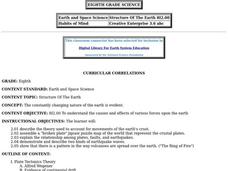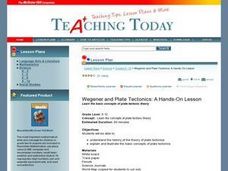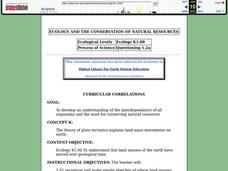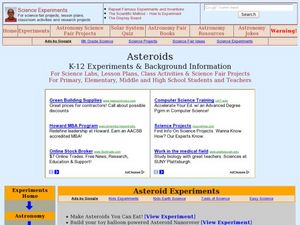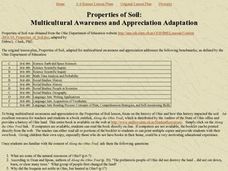Curated OER
Structure of the Earth
Eighth graders examine the forces that are constantly acting on the Earth. They describe the theory of tectonic plates and demonstrate the two kinds of earthquake waves. They also examine the role of volcanoes in the structure of the...
Curated OER
Athabaskan Migration & Bering Strait
Students examine the various migration patterns of the Athabaskan. In groups, they discuss the Bering Strait Land Bridge theory of migration and take notes on a lecture from their teacher. To end the lesson, they brainstorm the...
Curated OER
Solving Problems
In this solving problems worksheet, students answer twelve multiple choice questions about problem solving in science and the steps of the scientific method. These include identifying the problem, forming a hypothesis and setting up the...
Curated OER
Investigation 6 - Dinosaur Extinction
Fourth graders research and analyze theories on why dinosaurs became extinct. They need to find clues as to what the cause may have been. They record the evidence that they find to support their theory on the Dinosaur Extinction Theory...
Curated OER
About Science
Students explain why physics is the basic science. They outline scientific methods by distinguishing among observations, facts, hypotheses, laws, and principles. Students describe the circumstances under which a hypothesis or law must be...
Curated OER
Wegener and Plate Tectonics: A Hands-On Lesson
Students are introduced to and experiment with the basic concepts of plate tectonic theory as well as assess the history of the theory of plate tectonics. They explain and illustrate the basic concepts through diagrams and models of...
Curated OER
Ecology And the Conservation of Natural Resources
Students study Alfred Wegener's theory of continental drift and how the continents were connected in one large land mass called Pangaea. They examine plate tectonics and the theory that the earth's surface is composed of large moving...
Curated OER
Asteroids
Students examine a potential asteroid impact site. They describe evidence and theories for extinction events.
Curated OER
Time Travel, Black Holes, and Relativity
Students read the novel, The Time Machine, and compare H.G. Well's perceptions of the future with those presented in The Third Wave, by Alvin Toffler. They research current scientific and mathematical theories that relate to space and time.
Curated OER
Half Life Lab
Seventh graders model radioactive decay using pennies, collect data from their model, apply scientific visualization techniques to their data and create animated models explaining the concept of radioactive half-life.
Curated OER
The Ocean Floor
Fifth graders discuss the process of sedimentation and the continental drift theory. They locate major structures on the ocean floor and they identify life forms at each level of the ocean.
Curated OER
Properties of Soil
Students encounter various pieces of knowledge utilizing lessons that addresses a diversity of learners with multiple intelligences. They cover various concepts: science, Earth, scientific inquiry, geometry, data analysis, probability,...
Curated OER
Ancient Hunters of the Great Lakes
Students describe theories on how the first humans came to America and show the evidence that supports it. In this investigative lesson students study given material and prepare written or oral reports in their groups.
Curated OER
The Puzzle of the Ice Age Americans
Students describe alternative theories for how the first humans cane to America. In this human origin lesson students study the origins of the first Americans.
Curated OER
Soiled Again
High schoolers propose and perform an experiment using the scientific method. The purpose of the experiment is to discern some earth materials or combinations of earth materials that best increases the pH of "acid rain". From the results...
Curated OER
Energy: Exploring Alternative Forms
In the study of science, there is always
going to be research, data, theories and wonderful new discoveries. I feel that my interest
about energy will help me design an adequate unit full of intrigue and discovery. The
students should...
Curated OER
ARE WE IN THE MIDDLE OF A MASS EXTINCTION?
Learners identify and interpret the following: What is mass extinction, and what are some theories for why it happens? How often do species become extinct? What is the normal rate of extinction? Why are some species endangered? What...
Curated OER
Phosphate Testing Contract
Students examine how to prepare an experimental procedure. For this scientific method lesson students conduct an investigation on phosphate.
Curated OER
Learning Cycle Lesson Plan #6 (Misconception)
Ninth graders investigate evolution via natural selection and form an opinion. They support their opinion using scientific evidence and apply this to adaptations that have allowed certain organisms to survive.
Curated OER
Comparing Microscopic Organisms in Fresh and Polluted Water: An Invitation To Inquiry
Students have the opportunity to develop and formulate ideas and explanations through the scientific standard of inquiry. They identify organisms by using an identification key for specific aquatic geographical area.
Curated OER
Solar System Socratic Questions
Students reflect on and discuss theories of how the solar system was formed. They respond to prompts in a structured sequence to relate the formation of the solar system and the age of the Earth.
Curated OER
First Steps
Students examine how young children are generally able to learn foreign languages more easily than adults. In this investigative activity students divide into groups and devise a test to show whether or not this theory is true.
Curated OER
Becoming Whales: Experiencing Discoveries of
Students experience, through a "dig," the historical discovery of fossils which increasingly link whales to earlier land-dwelling mammals. They encounter the intermediate forms which show changes that lead to the modern whale.
Curated OER
The Hardy-Weinberg Equilibrium
Students act out a drama in this instructional activity on one aspect of the Hardy-Weinberg Equilibrium. They are to follow all stage directions precisely and give it their best effort to get across the main points of the play.


